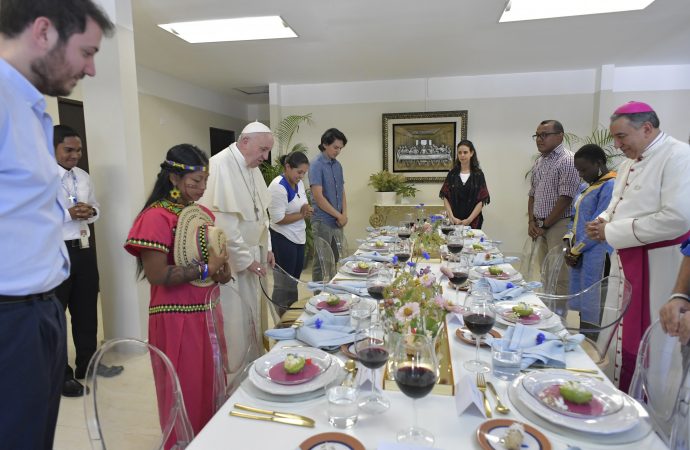Pope Francis has been challenged to go vegan for Lent - and in exchange for his sacrifice, he’d receive a $1 million donation to a charity of his choice.
The high-stakes deal is being offered by a 12-year-old animal rights activist, Genesis Butler, and the Million Dollar Vegan campaign.
Earlier this week, an open letter was published appealing to the pope to abstain from all animal products during Lent, which is set to begin on March 6 for Catholics and will end at Easter. The letter makes a strong case that a vegan diet will yield dividends for the environment.
“Your Holiness, we must act,” writes Butler. “Moving towards a plant-based diet will have substantial environmental benefits. It will protect our land, trees, oceans, and air, and help feed the world’s most vulnerable.”
Should the pope accept the offer, the million-dollar donation would be made by the Blue Horizon International Foundation, which seeks to “accelerate the removal of animals from the global food chain.”
In her letter, Butler also cited the pope’s 2015 encyclical Laudato si’, wherein he calls for collective common action to fight environmental degradation.
“In your encyclical letter, Laudato si’, you stated that every effort to protect and improve our world will involve changes in lifestyle, production, and consumption. I agree with all my heart and seek your support in tackling one of the largest underlying causes of the problems we face: animal agriculture,” wrote Butler.
In response to the initiative, Dan Misleh, executive director of Catholic Climate Covenant, told Crux, “It is so encouraging to see young people stepping up and reaching out. From their perspective, the future is grim and, fortunately for all of us, they are acting.”
While Misleh says a vegan diet may not be for everyone, he believes “we all need to consider a reduction in meat consumption as part of our response to climate change.”
“At a minimum, Catholics in wealthier countries ought to consider meatless Fridays and not just for Lent but for every Friday of the year. Wouldn’t that be a great witness to the world?” he asked. “It would be one very concrete way to rise to the challenges outlined by Pope Francis in Laudato si’.”
Kirsten Powers, a CNN political analyst and USA Today columnist, who is a vegetarian, concurred with Misleh and told Crux she hopes the pope accepts the offer.
“I pray that Pope Francis will accept this challenge to raise awareness of the grave damage the consumption of animal products does to the environment,” she said.
“A plant-based diet would also be better for the Holy Father’s health and for the animals that God has entrusted to the care of humans,” Powers continued.
Such a dare may prove intimidating for the Argentine pontiff, where his native country’s beef is one of its national treasures. In 2016 Argentina ranked second in the world for per capita meat consumption, just behind neighboring Uruguay.
Yet Fordham University theologian and author of the book For Love of Animals: Christian Ethics, Consistent Action Charles Camosy told Crux that there are three reasons he believes the pope should give it serious consideration.
“First, it witnesses to the nonviolent world God intended as revealed at the end of Genesis 1 and the nonviolent Kingdom to come with the lamb will lay down with the lion and the baby by the cobra’s lair. Second, it would put it in solidarity with our Orthodox Christian brothers and sisters who basically go vegan during Lent. And third it would be an important witness to how consuming animal products contributes to the existential threat of global climate change,” he said.
Camosy, who is also a contributor to Crux, said it would also “signal to climate skeptics-the people we need to convince-that people who claim that this is an existential threat are willing to change the way they live, not just call for the government coercion of others.”
The challenge from Butler and the Million Dollar Vegan campaign comes at a time when the intersection between the environment, pro-life concerns, and animal welfare are increasingly linked together. Camosy said that “care for non-human animals, and treating them with kindness…is something that is quite ‘hot’ in Christian theology right now.”
“Perhaps counter-intuitively, moral concern for animals returns us to a pre-Vatican II time in which the moral manuals actually took the ethics of our food choices seriously,” he continued. “The humanism of Vatican II - which elevated human beings in problematic ways over the rest of creation - actually stifled some of the development of how our food choices relate to moral concern for animals.”
To date, the Vatican has not announced whether or not Francis will accept the challenge.

